GNED 402 Reflection Paper: Inclusive Leadership and Effectiveness
VerifiedAdded on 2022/11/13
|5
|1052
|418
Essay
AI Summary
This essay is a reflection paper exploring the concept of inclusive leadership and its impact on organizational effectiveness, as discussed in a GNED 402 course. The student defines inclusive leadership, highlighting its attributes such as being people-oriented and understanding. The essay examines how inclusive leadership can lead to innovative behaviors and improve employee motivation and engagement. The student reflects on their personal experience in a food processing industry, contrasting an authoritative leadership style with the principles of inclusive leadership. The paper also discusses the challenges in understanding inclusive leadership and its importance for organizational success. The student concludes by emphasizing the importance of incorporating inclusive leadership in leadership styles and creating an environment that encourages inclusivity, drawing from their learning and experience.
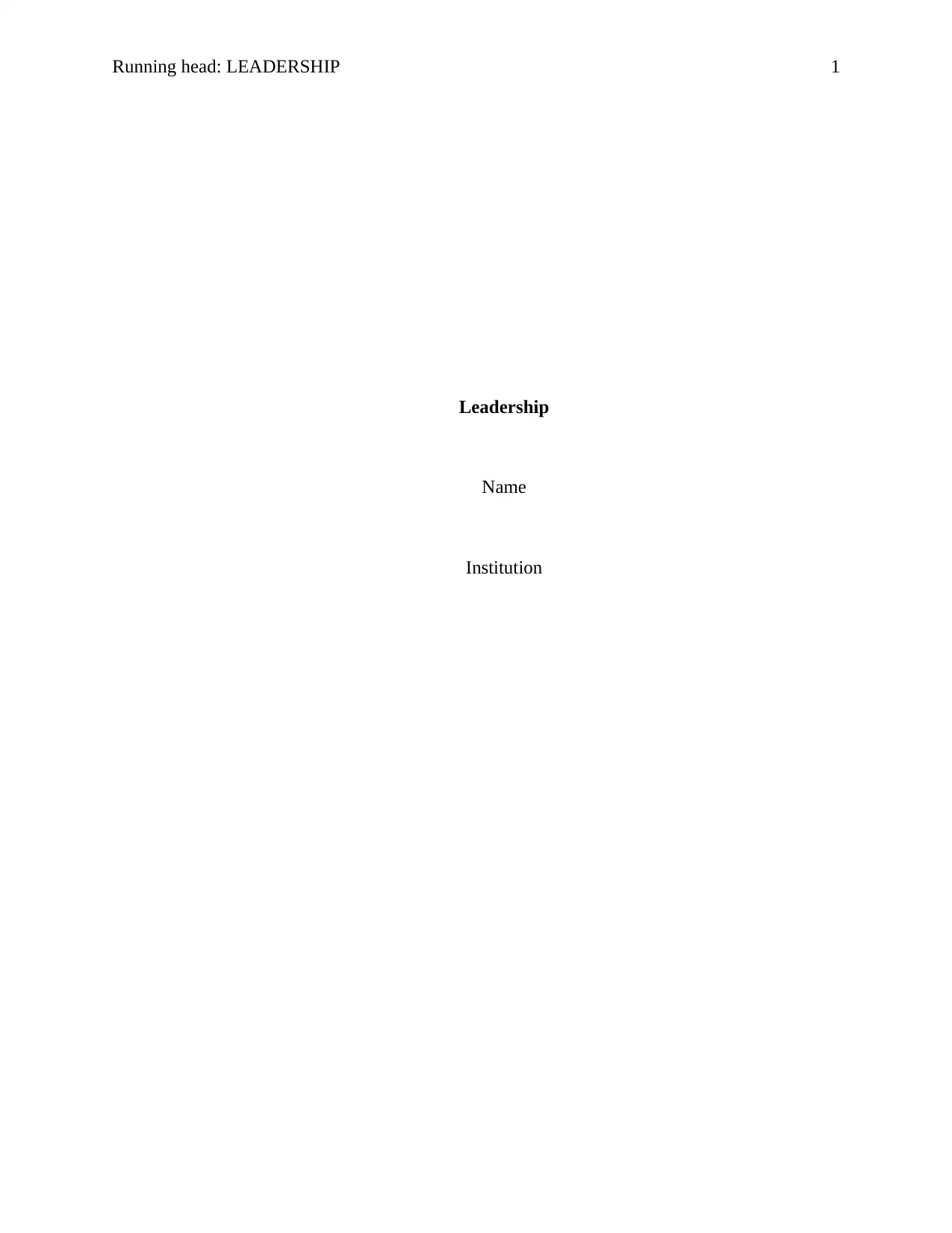
Running head: LEADERSHIP 1
Leadership
Name
Institution
Leadership
Name
Institution
Paraphrase This Document
Need a fresh take? Get an instant paraphrase of this document with our AI Paraphraser
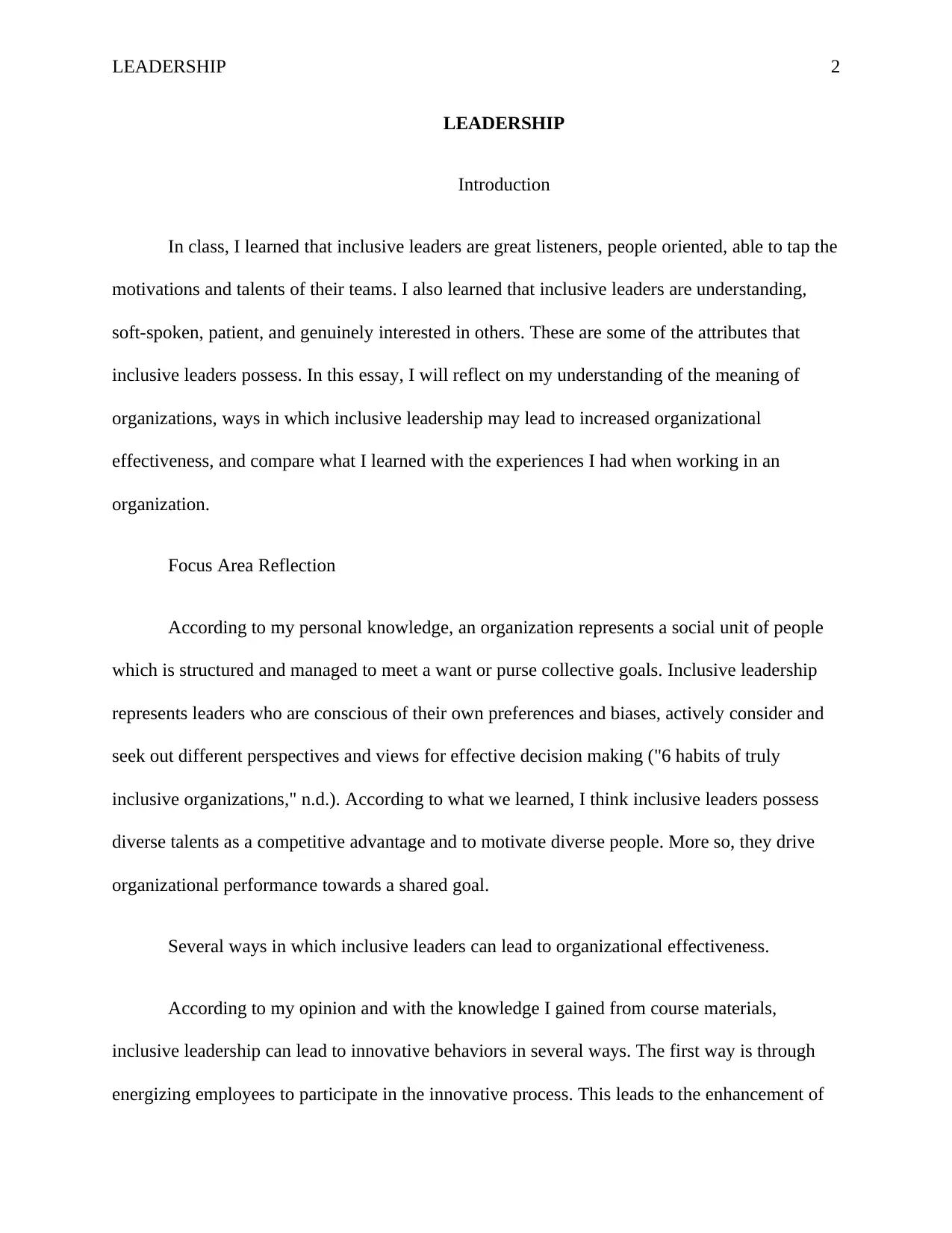
LEADERSHIP 2
LEADERSHIP
Introduction
In class, I learned that inclusive leaders are great listeners, people oriented, able to tap the
motivations and talents of their teams. I also learned that inclusive leaders are understanding,
soft-spoken, patient, and genuinely interested in others. These are some of the attributes that
inclusive leaders possess. In this essay, I will reflect on my understanding of the meaning of
organizations, ways in which inclusive leadership may lead to increased organizational
effectiveness, and compare what I learned with the experiences I had when working in an
organization.
Focus Area Reflection
According to my personal knowledge, an organization represents a social unit of people
which is structured and managed to meet a want or purse collective goals. Inclusive leadership
represents leaders who are conscious of their own preferences and biases, actively consider and
seek out different perspectives and views for effective decision making ("6 habits of truly
inclusive organizations," n.d.). According to what we learned, I think inclusive leaders possess
diverse talents as a competitive advantage and to motivate diverse people. More so, they drive
organizational performance towards a shared goal.
Several ways in which inclusive leaders can lead to organizational effectiveness.
According to my opinion and with the knowledge I gained from course materials,
inclusive leadership can lead to innovative behaviors in several ways. The first way is through
energizing employees to participate in the innovative process. This leads to the enhancement of
LEADERSHIP
Introduction
In class, I learned that inclusive leaders are great listeners, people oriented, able to tap the
motivations and talents of their teams. I also learned that inclusive leaders are understanding,
soft-spoken, patient, and genuinely interested in others. These are some of the attributes that
inclusive leaders possess. In this essay, I will reflect on my understanding of the meaning of
organizations, ways in which inclusive leadership may lead to increased organizational
effectiveness, and compare what I learned with the experiences I had when working in an
organization.
Focus Area Reflection
According to my personal knowledge, an organization represents a social unit of people
which is structured and managed to meet a want or purse collective goals. Inclusive leadership
represents leaders who are conscious of their own preferences and biases, actively consider and
seek out different perspectives and views for effective decision making ("6 habits of truly
inclusive organizations," n.d.). According to what we learned, I think inclusive leaders possess
diverse talents as a competitive advantage and to motivate diverse people. More so, they drive
organizational performance towards a shared goal.
Several ways in which inclusive leaders can lead to organizational effectiveness.
According to my opinion and with the knowledge I gained from course materials,
inclusive leadership can lead to innovative behaviors in several ways. The first way is through
energizing employees to participate in the innovative process. This leads to the enhancement of
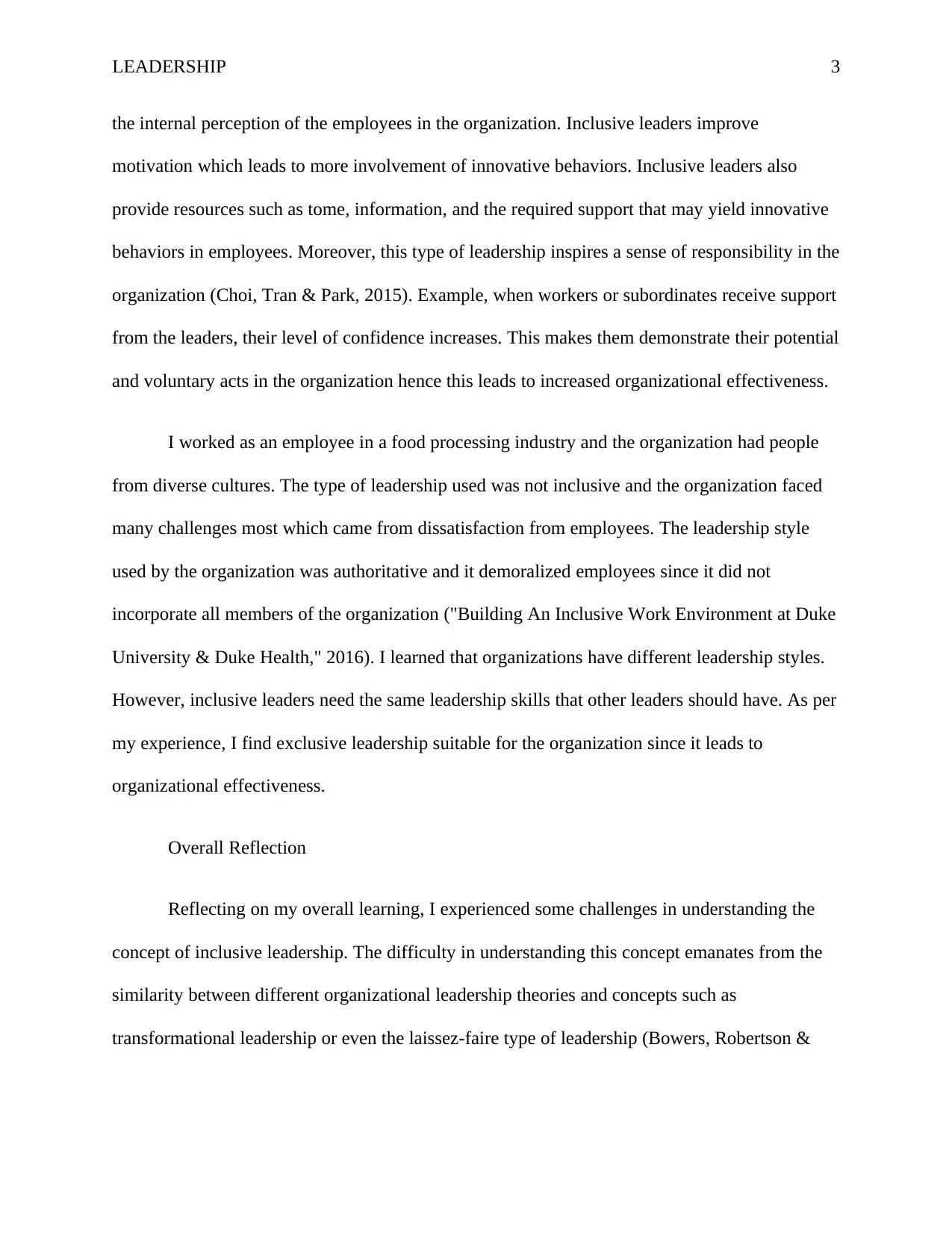
LEADERSHIP 3
the internal perception of the employees in the organization. Inclusive leaders improve
motivation which leads to more involvement of innovative behaviors. Inclusive leaders also
provide resources such as tome, information, and the required support that may yield innovative
behaviors in employees. Moreover, this type of leadership inspires a sense of responsibility in the
organization (Choi, Tran & Park, 2015). Example, when workers or subordinates receive support
from the leaders, their level of confidence increases. This makes them demonstrate their potential
and voluntary acts in the organization hence this leads to increased organizational effectiveness.
I worked as an employee in a food processing industry and the organization had people
from diverse cultures. The type of leadership used was not inclusive and the organization faced
many challenges most which came from dissatisfaction from employees. The leadership style
used by the organization was authoritative and it demoralized employees since it did not
incorporate all members of the organization ("Building An Inclusive Work Environment at Duke
University & Duke Health," 2016). I learned that organizations have different leadership styles.
However, inclusive leaders need the same leadership skills that other leaders should have. As per
my experience, I find exclusive leadership suitable for the organization since it leads to
organizational effectiveness.
Overall Reflection
Reflecting on my overall learning, I experienced some challenges in understanding the
concept of inclusive leadership. The difficulty in understanding this concept emanates from the
similarity between different organizational leadership theories and concepts such as
transformational leadership or even the laissez-faire type of leadership (Bowers, Robertson &
the internal perception of the employees in the organization. Inclusive leaders improve
motivation which leads to more involvement of innovative behaviors. Inclusive leaders also
provide resources such as tome, information, and the required support that may yield innovative
behaviors in employees. Moreover, this type of leadership inspires a sense of responsibility in the
organization (Choi, Tran & Park, 2015). Example, when workers or subordinates receive support
from the leaders, their level of confidence increases. This makes them demonstrate their potential
and voluntary acts in the organization hence this leads to increased organizational effectiveness.
I worked as an employee in a food processing industry and the organization had people
from diverse cultures. The type of leadership used was not inclusive and the organization faced
many challenges most which came from dissatisfaction from employees. The leadership style
used by the organization was authoritative and it demoralized employees since it did not
incorporate all members of the organization ("Building An Inclusive Work Environment at Duke
University & Duke Health," 2016). I learned that organizations have different leadership styles.
However, inclusive leaders need the same leadership skills that other leaders should have. As per
my experience, I find exclusive leadership suitable for the organization since it leads to
organizational effectiveness.
Overall Reflection
Reflecting on my overall learning, I experienced some challenges in understanding the
concept of inclusive leadership. The difficulty in understanding this concept emanates from the
similarity between different organizational leadership theories and concepts such as
transformational leadership or even the laissez-faire type of leadership (Bowers, Robertson &
⊘ This is a preview!⊘
Do you want full access?
Subscribe today to unlock all pages.

Trusted by 1+ million students worldwide
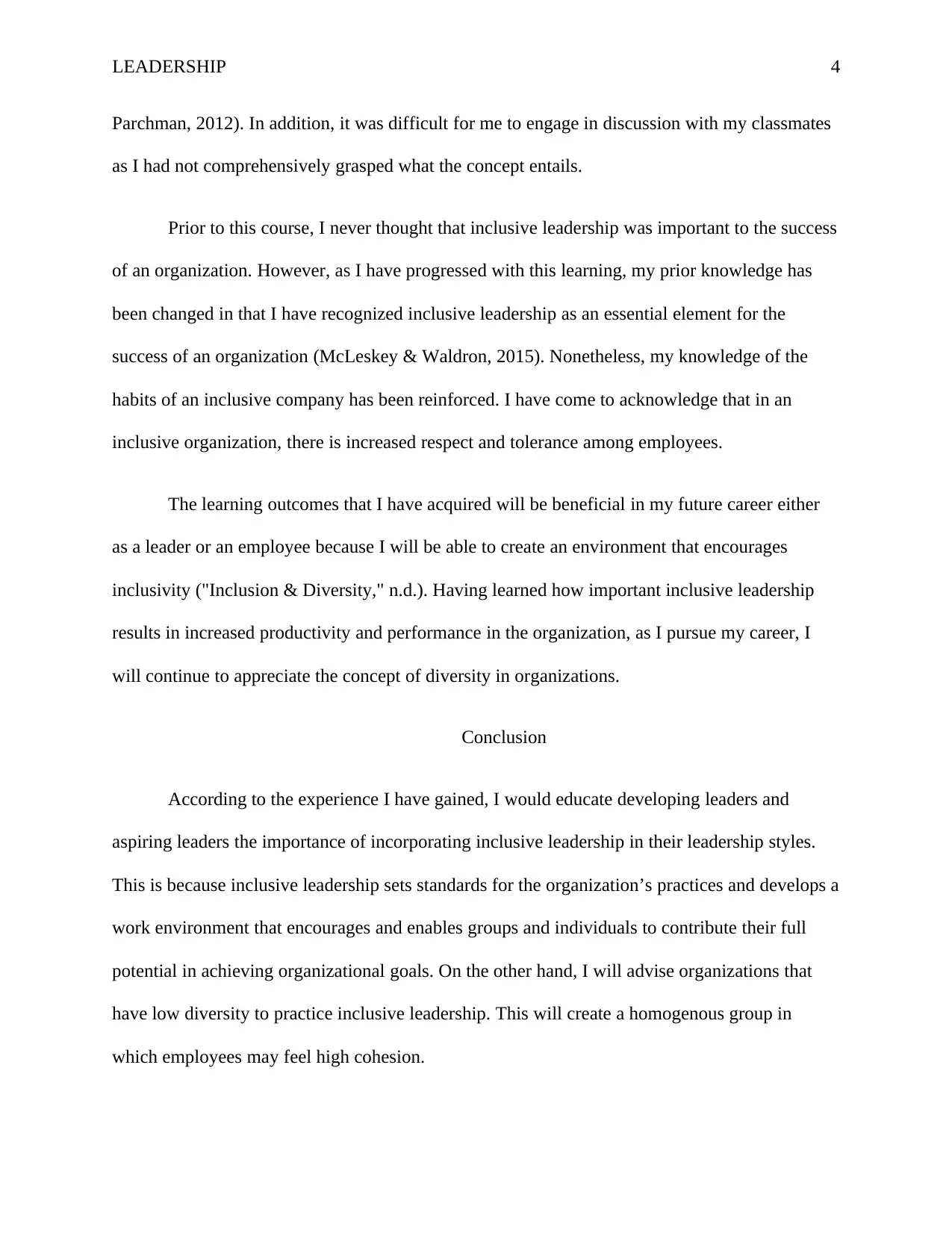
LEADERSHIP 4
Parchman, 2012). In addition, it was difficult for me to engage in discussion with my classmates
as I had not comprehensively grasped what the concept entails.
Prior to this course, I never thought that inclusive leadership was important to the success
of an organization. However, as I have progressed with this learning, my prior knowledge has
been changed in that I have recognized inclusive leadership as an essential element for the
success of an organization (McLeskey & Waldron, 2015). Nonetheless, my knowledge of the
habits of an inclusive company has been reinforced. I have come to acknowledge that in an
inclusive organization, there is increased respect and tolerance among employees.
The learning outcomes that I have acquired will be beneficial in my future career either
as a leader or an employee because I will be able to create an environment that encourages
inclusivity ("Inclusion & Diversity," n.d.). Having learned how important inclusive leadership
results in increased productivity and performance in the organization, as I pursue my career, I
will continue to appreciate the concept of diversity in organizations.
Conclusion
According to the experience I have gained, I would educate developing leaders and
aspiring leaders the importance of incorporating inclusive leadership in their leadership styles.
This is because inclusive leadership sets standards for the organization’s practices and develops a
work environment that encourages and enables groups and individuals to contribute their full
potential in achieving organizational goals. On the other hand, I will advise organizations that
have low diversity to practice inclusive leadership. This will create a homogenous group in
which employees may feel high cohesion.
Parchman, 2012). In addition, it was difficult for me to engage in discussion with my classmates
as I had not comprehensively grasped what the concept entails.
Prior to this course, I never thought that inclusive leadership was important to the success
of an organization. However, as I have progressed with this learning, my prior knowledge has
been changed in that I have recognized inclusive leadership as an essential element for the
success of an organization (McLeskey & Waldron, 2015). Nonetheless, my knowledge of the
habits of an inclusive company has been reinforced. I have come to acknowledge that in an
inclusive organization, there is increased respect and tolerance among employees.
The learning outcomes that I have acquired will be beneficial in my future career either
as a leader or an employee because I will be able to create an environment that encourages
inclusivity ("Inclusion & Diversity," n.d.). Having learned how important inclusive leadership
results in increased productivity and performance in the organization, as I pursue my career, I
will continue to appreciate the concept of diversity in organizations.
Conclusion
According to the experience I have gained, I would educate developing leaders and
aspiring leaders the importance of incorporating inclusive leadership in their leadership styles.
This is because inclusive leadership sets standards for the organization’s practices and develops a
work environment that encourages and enables groups and individuals to contribute their full
potential in achieving organizational goals. On the other hand, I will advise organizations that
have low diversity to practice inclusive leadership. This will create a homogenous group in
which employees may feel high cohesion.
Paraphrase This Document
Need a fresh take? Get an instant paraphrase of this document with our AI Paraphraser
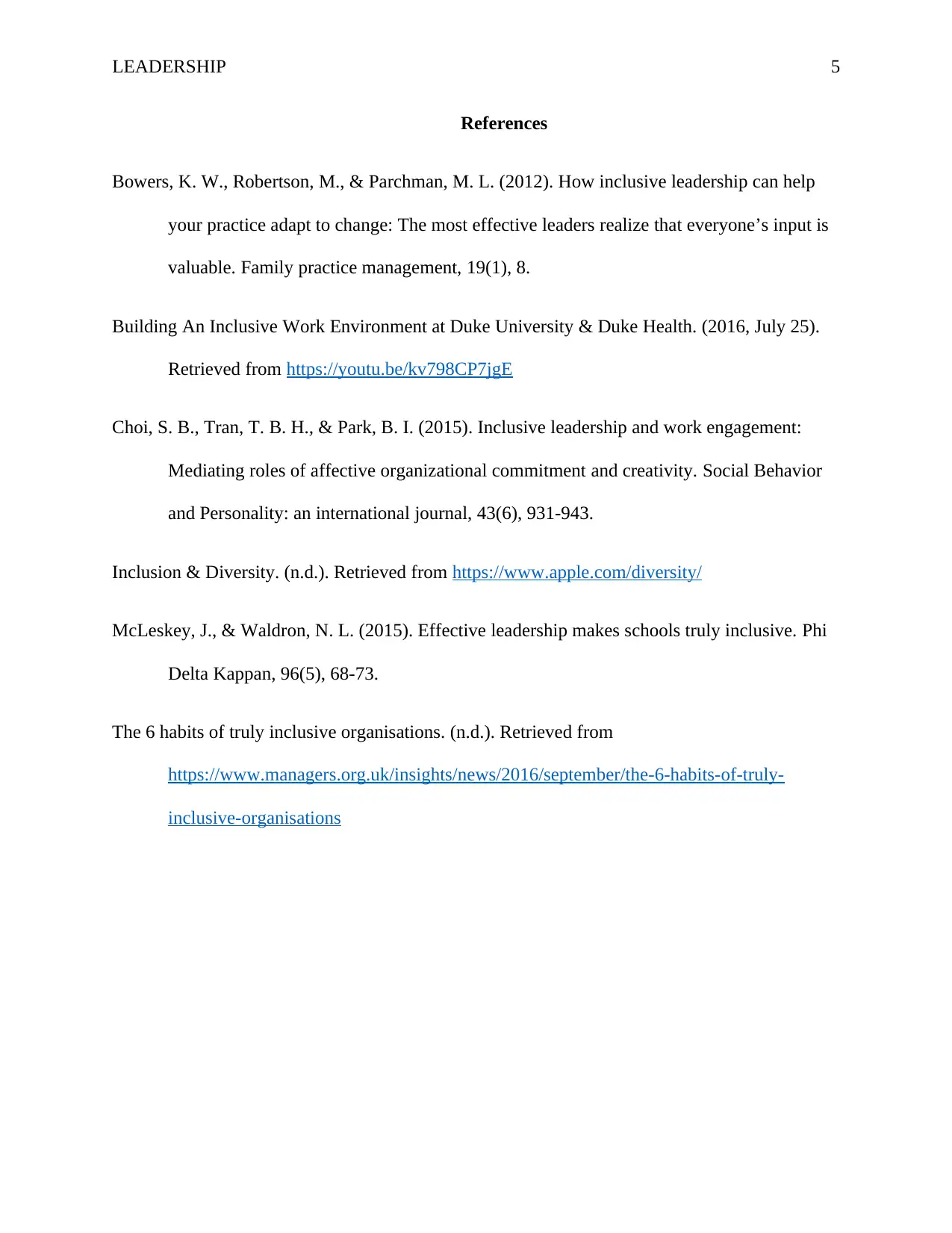
LEADERSHIP 5
References
Bowers, K. W., Robertson, M., & Parchman, M. L. (2012). How inclusive leadership can help
your practice adapt to change: The most effective leaders realize that everyone’s input is
valuable. Family practice management, 19(1), 8.
Building An Inclusive Work Environment at Duke University & Duke Health. (2016, July 25).
Retrieved from https://youtu.be/kv798CP7jgE
Choi, S. B., Tran, T. B. H., & Park, B. I. (2015). Inclusive leadership and work engagement:
Mediating roles of affective organizational commitment and creativity. Social Behavior
and Personality: an international journal, 43(6), 931-943.
Inclusion & Diversity. (n.d.). Retrieved from https://www.apple.com/diversity/
McLeskey, J., & Waldron, N. L. (2015). Effective leadership makes schools truly inclusive. Phi
Delta Kappan, 96(5), 68-73.
The 6 habits of truly inclusive organisations. (n.d.). Retrieved from
https://www.managers.org.uk/insights/news/2016/september/the-6-habits-of-truly-
inclusive-organisations
References
Bowers, K. W., Robertson, M., & Parchman, M. L. (2012). How inclusive leadership can help
your practice adapt to change: The most effective leaders realize that everyone’s input is
valuable. Family practice management, 19(1), 8.
Building An Inclusive Work Environment at Duke University & Duke Health. (2016, July 25).
Retrieved from https://youtu.be/kv798CP7jgE
Choi, S. B., Tran, T. B. H., & Park, B. I. (2015). Inclusive leadership and work engagement:
Mediating roles of affective organizational commitment and creativity. Social Behavior
and Personality: an international journal, 43(6), 931-943.
Inclusion & Diversity. (n.d.). Retrieved from https://www.apple.com/diversity/
McLeskey, J., & Waldron, N. L. (2015). Effective leadership makes schools truly inclusive. Phi
Delta Kappan, 96(5), 68-73.
The 6 habits of truly inclusive organisations. (n.d.). Retrieved from
https://www.managers.org.uk/insights/news/2016/september/the-6-habits-of-truly-
inclusive-organisations
1 out of 5
Related Documents
Your All-in-One AI-Powered Toolkit for Academic Success.
+13062052269
info@desklib.com
Available 24*7 on WhatsApp / Email
![[object Object]](/_next/static/media/star-bottom.7253800d.svg)
Unlock your academic potential
Copyright © 2020–2026 A2Z Services. All Rights Reserved. Developed and managed by ZUCOL.





